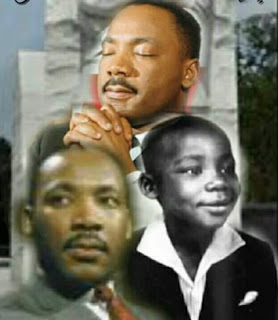LESSONS IN GREATNESS FROM THE LIFE OF DR. KING
LESSONS IN GREATNESS FROM THE LIFE OF DR. KING
“What do we really know about The Reverend Dr. Martin Luther King Jr.? We know he had a dream. We know he inspired people to take positive action. We know he organized marches, led boy-cotts, wrote books, delivered speeches, spent time in jail, met with presidents, and brought about momentous change. We also know that he paid with his life at the young age of 39. But there's so much more to the story. Dr. King's life is full of important lessons that all of us can put into practice. These are things we can do right now -- in the workplace, in our communities, with our families, and elsewhere.
LESSON #1 -- BE GUIDED BY A DEEPLY POSITIVE PURPOSE At age 14, Martin Luther King Jr. won an oratory contest with his speech on "The Negro and the Constitution." On the 90-minute trip back home, he and his teacher were forced to stand on the bus so all of the white passengers could get seats. It was a searing memory for King, but instead of becoming bitter, he resolved to take positive action. At age 16, he wrote a letter to the editor of the Atlanta Journal Constitution calling for racial justice. Until his death in 1968, King made it his mission to create a world where everyone could reach their full potential --where people are judged not "by the color of their skin, but by the content of their character."
LESSON #2 -- SEE THE CONNECTIONS From the beginning, King was thinking big. He knew that racism, segregation, and violence were dragging down not just African Americans but all of humanity. As he put it: "Injustice anywhere is a threat to justice everywhere. We are caught in an inescapable network of mutuality, tied in a single garment of destiny. Whatever affects one directly, affects all indirectly."
LESSON #3 -- TURN WEAKNESSES INTO STRENGTHS King had wisdom beyond his years and a high IQ to match. He skipped kindergarten and entered first grade at age 5. He skipped his senior year and headed to Morehouse College at age15. He moved forward so quickly that his reading skills fell behind. By some accounts, he had an eighth-grade reading level when entering college. Many people would have steered clear of their weakness by avoiding books, but King did just the opposite. He became a voracious reader and writer -- and a lifelong seeker of knowledge, information, and insight.
LESSON #4 -- DO WHAT IT TAKES TO GET THE JOB DONE King became pastor of Dexter Avenue Baptist Church in Montgomery, Alabama, in 1954. He was still pursuing his doctoral degree at the time, so the demands on his schedule were almost overwhelming. He displayed the tremendous discipline that would characterize his entire life, waking up before sunrise every morning to spend several hours working on his doctoral thesis. His pastor duties would fill most of the day, then he would spend the last three hours back at work on his thesis. He received his Ph.D. in 1955.
LESSON #5 -- PURSUE A STRATEGY THAT FITS YOUR VALUES Like any good leader, King sought an overarching strategy for carrying out his mission. He looked to history for guidance and was struck by the fact that so many major social changes had been forced through at gunpoint. Then he heard a speech about Mohandas Gandhi, who was bringing about change in India through nonviolent civil disobedience. The strategy aligned perfectly with King's values, and it held the promise of unifying all people rather than benefitting a single group. King rushed out and bought six books about Gandhi and his methods.
LESSON #6 -- FULLY USE YOUR GREATEST STRENGTHS As the years unfolded, King made the most of his powers of communication. In 1955, when Rosa Parks was arrested for keeping her seat on the bus, King spoke out for positive change. As president of the Montgomery Improvement Association, he inspired people to stop using the buses altogether. Montgomery desegregated its bus system within a year. Just about everyone can hear his clear voice declaring "I have a dream," but before and after that immortal speech from the Lincoln Memorial, King spoke out time and again from pulpits, parking lots, courtrooms, classrooms, legislative halls, and the Oval Office. Even in jail, King kept up his mission of creating a better future, turning to the written word with his "Letter from a Birmingham Jail."
LESSON #7 -- DEVELOP A PLAN FOR BEING YOUR BEST Six months before his assassination in 1968, King spoke to a group of students. He talked to them about the importance of having a "life blueprint" - a deeply held design of what each of them intended to accomplish in life. He encouraged them to strive for excellence at all times. And long before anyone coined the term "servant leadership," King preached the importance of making service the centerpiece of life, regardless of one's occupation. As he famously put it: "If a man is called to be a street sweeper, he should sweep streets even as Michelangelo painted, or Beethoven composed music, or Shakespeare wrote poetry. He should sweep streets so well that all the hosts of heaven and earth will pause to say, 'Here lived a great street sweeper who did his job well.”
“Injustice anywhere is a threat to justice everywhere.” Martin Luther King, Jr.



Comments
Post a Comment